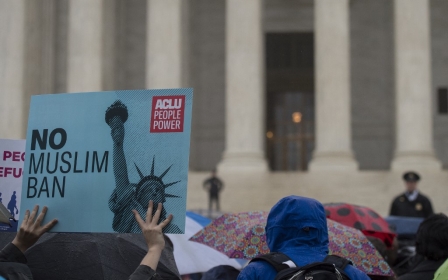US House passes 'No Ban Act' seeking to prohibit religious-based immigration orders

The US House of Representatives on Wednesday passed "The No Ban Act", a bill that would guard against any president issuing discriminatory travel restrictions - such as former President Donald Trump's so-called "Muslim Ban".
In a 218-208 vote in favour, split near-entirely down party lines, the House passed the legislation, which was introduced by Representative Judy Chu and co-sponsored by at least 137 House members. Only one Republican voted in favour of the bill.
The legislation prohibits religious-based immigration orders and amends a section of US law to require that any president attempting to install a travel ban first present evidence of a credible threat and get approval from the Secretary of State and the Department of Homeland Security.
'America does not ban people because of their religion'
- Judy Chu, House Representative
Later on Wednesday, the House was also expected to approve a related measure that would require that certain immigrants be allowed access to a lawyer when they are detained at US ports of entry.
President Joe Biden's office issued a statement before the legislative session on Wednesday voicing support for both bills.
New MEE newsletter: Jerusalem Dispatch
Sign up to get the latest insights and analysis on Israel-Palestine, alongside Turkey Unpacked and other MEE newsletters
"While the Administration believes that certain exercises of section 212(f) authority may be warranted under emergency circumstances, the prior Administration’s haphazard misuse of this authority highlights the need for reasonable constraints," the statement reads, referring to the section of US law that the bill seeks to amend.
During the debate that preceded Wednesday's vote, Representative Chu said passing the bill was a matter of values, stating "America does not ban people because of their religion".
"Today we can make sure it never happens again," Chu said.
Divided down party lines
President Biden rescinded the Trump-era Muslim Ban on his first day in office in January, however, the No Ban Act was re-introduced a month later with future administrations in mind.
Representative Jerrold Nadler, judiciary committee chairman, stressed the importance of amending presidential powers with regards to travel restrictions, given the actions of the past administration.
"Former President Trump abused [his] authority, twisting it in ways that were never intended," Representative Nadler said, urging his colleagues to restore the separation of powers by limiting overly broad executive authority.
Republicans who spoke against the legislation mostly argued in favour of stricter US immigration policy, with several taking specific objection to the idea that a sitting president would need approval from his or her own cabinet to make an executive decision on a potential travel ban.
"In this bill, the president may only act if the Secretary of State allows him to act," Representative Andy Biggs, a Republican, said. "The Secretary of State should not be authorised in statute to tell the president - the Secretary of State's boss - that the president may act."
Representative Tom McClintock, a Republican from California, accused Democrats of pandering to the "radical left" and denied that former President Trump's travel restrictions targeted Muslims specifically.
"In this world that is becoming increasingly threatening and unstable, does this bill make us more safe or less safe? The answer should be obvious to anyone who is not completely besotted with the woke agenda of the radical left," McClintock said.
The bill will now move to the Senate, where it will be taken forwards by Senator Chris Coons, a Democrat from Delaware.
"The No Ban Act is among the most basic things that Congress can do to create a more fair, humane, and workable immigration system," said Philip Wolgin, acting vice-president of Immigration Policy at the Center for American Progress.
"We urge the Senate to pass the bill immediately."
Middle East Eye delivers independent and unrivalled coverage and analysis of the Middle East, North Africa and beyond. To learn more about republishing this content and the associated fees, please fill out this form. More about MEE can be found here.





